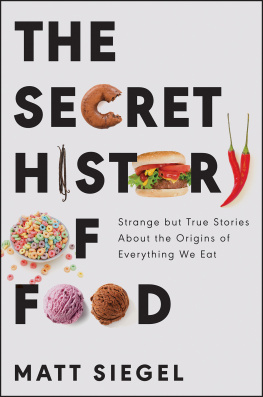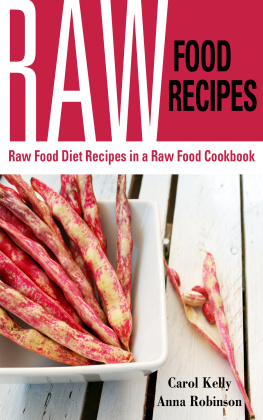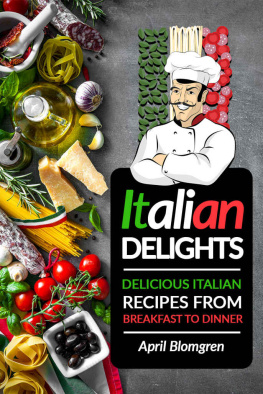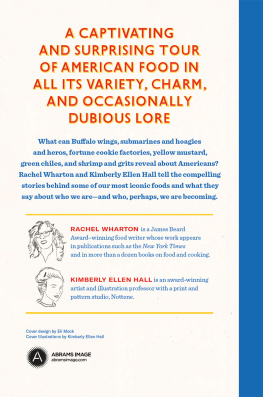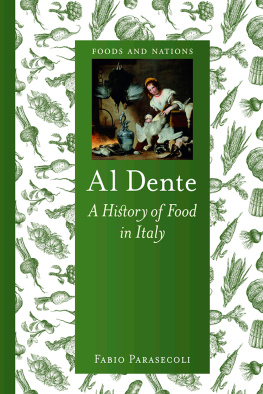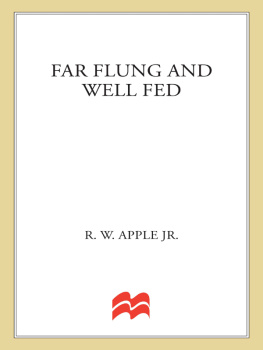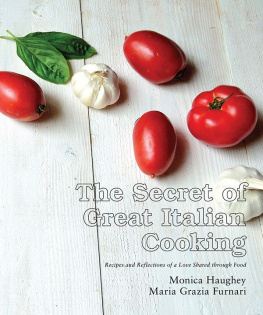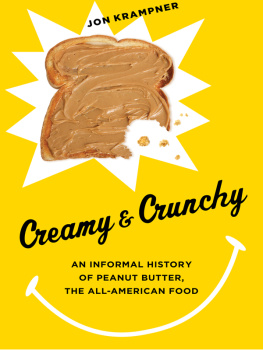Contents
For my mother, and her cooking.
And my father, and his eating.
History celebrates the battlefields whereon we meet our death, but scorns to speak of the plowed fields whereby we thrive. It knows the names of the kings bastards but cannot tell us the origin of wheat. This is the way of human folly.
Jean-Henri Fabre
Of the many choices we make in our lives, what to eat is perhaps the most enduring and important. Whereas individual human beings can go through life without participating in political acts and without personal liberty and can survive without forming a family or having sex, none of us can go without food. It is the absolute biological necessity of food that makes it so central to cultural history and so inclusive of all peoples in all times.
B. W. Higman
Chapter 1
A History of Swallowing
... the pursuit of more and better food has helped to directsometimes decisively, more often subtlythe movement of history itself.
Reay Tannahill
Tell me what you eat, and I shall tell you what you are.
These are the words written by Jean Anthelme Brillat-Savarin, one of historys most enduring and influential food writersa guy who not only had a cheese named after him (a triple-cream, semisoft cows milk cheese with a luxurious mouthfeel reminiscent of tangy,.
Granted, not all of Brillats meditations have aged as well as his cheese. For example, his belief that eating starches softens a mans flesh and courage (For proof one can cite the Indians, who live almost exclusively on rice and who are the prey of almost anyone who wishes to conquer them.), his endorsement of sugar water as a healthy and refreshing tonic, or his frequent rants on obesity:
Suggest to a charming fat lady that she mount a horse, and she will consent with great pleasure, but on three conditions: first, she must have a steed which is at one and the same time handsome, lively, and gentle; second, she must have a riding habit which is new and tailored in the latest style; third, she must have to accompany her a groom who is agreeable and good-looking. It is rather rare to fill all three of these requirements, so she does not ride at all.
Or I can remember only two really fat heroes.
Others are open to debate, such as his opinion on serving a cheese courseand, simultaneously, on the material worth of disfigured cyclopean women: A dinner which ends without cheese is like a beautiful woman with only one eye.
Yet he was clearly ahead of his time on other points, being one of the first to extol the benefits of a low-carbohydrate diet; to draw a connection between the consumption of refined carbohydrates and obesity; and to urge parents to forbid coffee to their children with great severity, if they do not wish to produce dried-up little monsters, stunted and old before they are twenty, all notions that have since become common knowledge.
And he was also right in his premonition that what we eat defines us not just physically but psychologically, socially, symbolically, and spirituallyto a much greater degree, in fact, than he could have known in the 1800s.
Modern science, for example, has taught us that its not only what we eat that defines us but what our parents ate.
Numerous studies suggest that our adult preferences for salt are predicted by our mothers fluid loss
In one study, infants whose mothers consumed carrot juice during pregnancy and lactation showed a greater preference for carrot-flavored cereal; than those who were given formula, owing to their exposure to a greater variety of flavors early on.
Of course, the notion that breast milk can influence human behavior is nothing new. For thousands of years, long before Brillat-Savarin, it was considered common knowledge that things like personality traits and intellect were passed on through breastfeeding, of a nource not of yll complexion and of worse maners, but suche as shall be sobre, honest and chaste, well fourmed, amyable and chearefull... no dronkarde, vycyous nor sluttysshe, for suche corrupteth the nature of the chylde. Imagine those wanted ads.
Meanwhile, it was thought that drinking animal milk made you act like an animal.
And its not just what our parents ate that defines us but how much they ate. A parents diet and caloric intake can affect whether the genes handed down to us are switched on or off, a process called epigenetic inheritance before breeding parented offspring with an increased likelihood of diabetes and a more than 20 percent increase in weight and body fat.
And these patterns seem to hold true for humans, too. A review of more than thirty studies from the Netherlands, the United States, France, India, Norway, Sweden, the United Kingdom, Germany, New Zealand, and Australia concluded that fetal exposure to poor nutrition impacted their children and grandchildrens risk of heart disease and diabetes.
Other inherited influences go back even further; you might take pride in your sophisticated palate for black truffles, sour ale, charred brussels sprouts, and single-origin coffeebut your preference for them is, to some degree, genetic. Similar to color blindness, roughly half of the population doesnt have the olfactory capacity to sense androstenone,
Similarly, our sensitivity to bitter foods is largely associated with a gene called TAS2R38, and avoid things like coffee, wine, spirits, dark chocolate, and various fruits and vegetables (e.g., grapefruit, broccoli, kale) because they find them too bitter.
In fact, its plausible that all of our ancestors were effectively supertasters at one point, as its no coincidence that a lot of things that are toxic in nature tend to be bitter or acidic, were all bitter and toxic before human intervention, while ears of ancient corn were roughly the size of cigarettes with miniature kernels hard enough to break teeth.
This is basically the same story behind milk. Initially, humans were able to digest milk only as infants. Biologically, there are a lot of good reasons for this: particularly for mothers who are malnourished, breastfeeding can make it harder to get pregnant again, so a mother who stops breastfeeding earlier has more chances to add to the gene pool. Plus, you want the previous child to be finished nursing by the time the next child is born, as otherwise theyd have to compete for limited resources, and producing enough milk for one kid is already difficult.
So continuing to breastfeed beyond infancy wasnt good for the tribe. Like other mammals, people would naturally stop producing lactase, the enzyme needed to digest lactose, to varying degrees, so lactose intolerance is still the norm rather than the exception.)
Our genetic tolerance for alcohol consumption (e.g., level of inebriation, dizziness, facial flushing, and absorption rate
Yet far and away the biggest link between what we eat and who we are arose from the discovery of cookingand we can trace a lot of the things we see in grocery stores (and modern society) back to our decision to start putting raw meats and vegetables into controlled fires (or waters heated by geothermal springs) somewhere between 2 million and 200,000 years ago, a pivotal milestone that transformed us just as much as it transformed our diet.
Cooking made it possible to eat a lot of foods that would otherwise have been toxic, inedible, or indigestible. Even modern staples such as wheat, corn, and potatoes arent very palatable (or digestible) without exposure to heat or fire, let alone scavenged prehistoric roots and plant stems. Cooking potatoes, for example, not only makes them infinitely more pleasant going down but makes their starch content more than 90 percent more digestible, not only increases digestibility but also kills an enzyme that could otherwise cause potentially fatal cyanide poisoning. Meanwhile, cooking also increases the shelf life of foods, both in the short term by killing germs and bacteria and in the long term by removing moisture through smoking or drying, particularly in the case of meats. This, in turn, made foods more transportable, which also increased the odds of survival, as hanging around freshly killed animals tended to make one prey for other animals.

